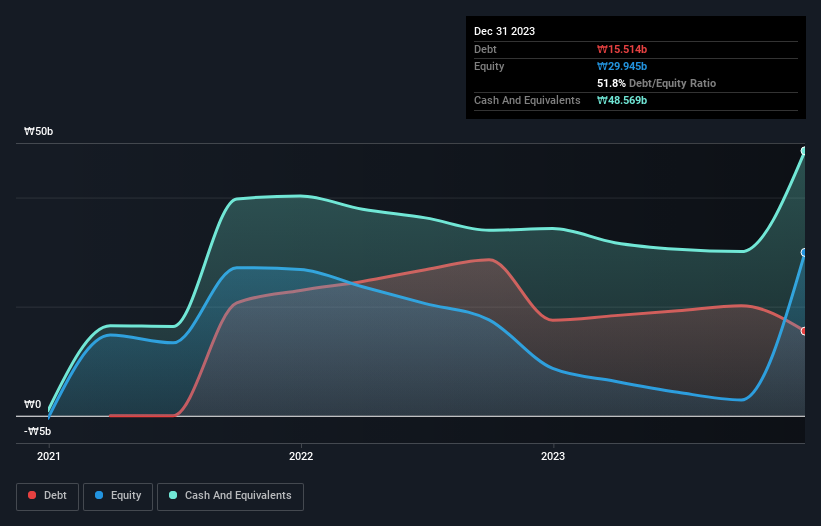- South Korea
- /
- Media
- /
- KOSDAQ:A321820
Health Check: How Prudently Does WIDER PLANET (KOSDAQ:321820) Use Debt?
Howard Marks put it nicely when he said that, rather than worrying about share price volatility, 'The possibility of permanent loss is the risk I worry about... and every practical investor I know worries about.' When we think about how risky a company is, we always like to look at its use of debt, since debt overload can lead to ruin. As with many other companies WIDER PLANET Inc. (KOSDAQ:321820) makes use of debt. But the real question is whether this debt is making the company risky.
When Is Debt Dangerous?
Debt and other liabilities become risky for a business when it cannot easily fulfill those obligations, either with free cash flow or by raising capital at an attractive price. In the worst case scenario, a company can go bankrupt if it cannot pay its creditors. However, a more common (but still painful) scenario is that it has to raise new equity capital at a low price, thus permanently diluting shareholders. Of course, plenty of companies use debt to fund growth, without any negative consequences. The first step when considering a company's debt levels is to consider its cash and debt together.
See our latest analysis for WIDER PLANET
How Much Debt Does WIDER PLANET Carry?
As you can see below, WIDER PLANET had ₩15.5b of debt at December 2023, down from ₩17.5b a year prior. But it also has ₩48.6b in cash to offset that, meaning it has ₩33.1b net cash.

How Strong Is WIDER PLANET's Balance Sheet?
We can see from the most recent balance sheet that WIDER PLANET had liabilities of ₩30.8b falling due within a year, and liabilities of ₩480.9m due beyond that. On the other hand, it had cash of ₩48.6b and ₩1.86b worth of receivables due within a year. So it can boast ₩19.2b more liquid assets than total liabilities.
This surplus suggests that WIDER PLANET has a conservative balance sheet, and could probably eliminate its debt without much difficulty. Succinctly put, WIDER PLANET boasts net cash, so it's fair to say it does not have a heavy debt load! There's no doubt that we learn most about debt from the balance sheet. But it is WIDER PLANET's earnings that will influence how the balance sheet holds up in the future. So if you're keen to discover more about its earnings, it might be worth checking out this graph of its long term earnings trend.
In the last year WIDER PLANET had a loss before interest and tax, and actually shrunk its revenue by 29%, to ₩21b. To be frank that doesn't bode well.
So How Risky Is WIDER PLANET?
We have no doubt that loss making companies are, in general, riskier than profitable ones. And in the last year WIDER PLANET had an earnings before interest and tax (EBIT) loss, truth be told. Indeed, in that time it burnt through ₩1.3b of cash and made a loss of ₩4.8b. While this does make the company a bit risky, it's important to remember it has net cash of ₩33.1b. That means it could keep spending at its current rate for more than two years. Overall, its balance sheet doesn't seem overly risky, at the moment, but we're always cautious until we see the positive free cash flow. There's no doubt that we learn most about debt from the balance sheet. But ultimately, every company can contain risks that exist outside of the balance sheet. For instance, we've identified 3 warning signs for WIDER PLANET that you should be aware of.
At the end of the day, it's often better to focus on companies that are free from net debt. You can access our special list of such companies (all with a track record of profit growth). It's free.
The New Payments ETF Is Live on NASDAQ:
Money is moving to real-time rails, and a newly listed ETF now gives investors direct exposure. Fast settlement. Institutional custody. Simple access.
Explore how this launch could reshape portfolios
Sponsored ContentNew: Manage All Your Stock Portfolios in One Place
We've created the ultimate portfolio companion for stock investors, and it's free.
• Connect an unlimited number of Portfolios and see your total in one currency
• Be alerted to new Warning Signs or Risks via email or mobile
• Track the Fair Value of your stocks
Have feedback on this article? Concerned about the content? Get in touch with us directly. Alternatively, email editorial-team (at) simplywallst.com.
This article by Simply Wall St is general in nature. We provide commentary based on historical data and analyst forecasts only using an unbiased methodology and our articles are not intended to be financial advice. It does not constitute a recommendation to buy or sell any stock, and does not take account of your objectives, or your financial situation. We aim to bring you long-term focused analysis driven by fundamental data. Note that our analysis may not factor in the latest price-sensitive company announcements or qualitative material. Simply Wall St has no position in any stocks mentioned.
About KOSDAQ:A321820
Artist
Engages in developing mobile and web-based advertising service systems and conducting advertising agency business in South Korea and internationally.
Excellent balance sheet and slightly overvalued.
Market Insights
Weekly Picks

Early mover in a fast growing industry. Likely to experience share price volatility as they scale


A case for CA$31.80 (undiluted), aka 8,616% upside from CA$0.37 (an 86 bagger!).


Moderation and Stabilisation: HOLD: Fair Price based on a 4-year Cycle is $12.08
Recently Updated Narratives


Positioned to Win as the Streaming Wars Settle

Meta’s Bold Bet on AI Pays Off

ADP Stock: Solid Fundamentals, But AI Investments Test Its Margin Resilience
Popular Narratives


Crazy Undervalued 42 Baggers Silver Play (Active & Running Mine)


NVDA: Expanding AI Demand Will Drive Major Data Center Investments Through 2026


The AI Infrastructure Giant Grows Into Its Valuation
Trending Discussion




